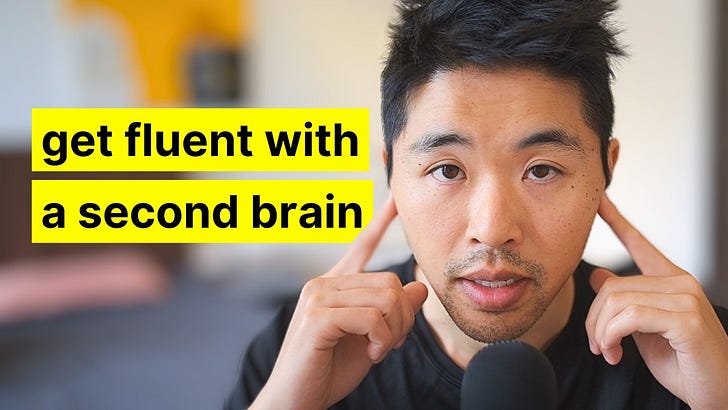What if I told you that you have everything you need to learn Chinese or any language fast, already in your head?
We've all learned to speak our first language fluently as children, without fancy apps or AI. But for some reason, with all these fancy tools, it seems even harder to stay focused and learn a language.
The truth is, you don’t need another app or AI tool, it’s not the answer to your language learning. These tools have become a distraction. The most powerful tool is one we already have, it’s your brain.
The problem? We live in a world designed to distract us from reaching our goals and our brain hasn’t caught up.
The good news? You’re already good at languages. You just need to tweak the fundamentals and build an environment that helps you learn instead of hurts you.
This is the simple three-step system I used to teach myself Mandarin Chinese in just one year without grinding vocabulary and burning myself out.
But before we fix the problem, we need to understand why it’s happening in the first place.
The Problem with Learning
You keep studying, but it doesn’t feel like you’re learning.
You keep memorizing, but it doesn’t feel like you remember.
You keep highlighting, but nothing sticks.
The problem isn’t your effort—it’s your focus.
Whether it’s learning a language or learning any skill, learning can be broken down into two key steps: consumption (gaining knowledge) and creation (applying knowledge).
Think back to when you learned to walk. We consumed first by watching our mom and dad walk and then we created by trying to walk ourselves, falling and getting back up.
When you learned your first language, you listened to your parents speak (consumption), then mimicked their words (creation), first poorly and later fluently.
We balanced consumption with creation.
But today, that balance is gone. We live in an age of endless information, where consumption is effortless, addicting, and never-ending. We all carry $1,000 supercomputers in our pockets, designed to distract us, hijack our focus, and keep us addicted to passive consumption.
We live in a world with an information obesity epidemic. Just like processed food is designed to make us crave more, cheap, flashy content spikes our dopamine and keeps us scrolling. It rewires our brains to crave stimulation, making it harder to sit still, read, or focus deeply.
It’s the “brainrot” generation we’ve all heard about—hooked on hyper-edited videos, unable to concentrate without constant stimulation.
But here’s the hard truth: You are what you consume. If you feed your brain junk, you’ll output junk. If you let social media hijack your focus, it will steal your ability to think deeply, create, and grow.
You don’t have your own ideas because your mind is packed with other people’s ideas.
If you don’t control your information diet, someone else will—and they don’t have your best interests in mind
But we already know the real key to learning. It’s not about how much information you collect—it’s about how much you retain, remember, and use with confidence.
How do we do that?
Learn Languages Faster in 3 Steps
1. Stop Consuming the Bad Stuff
The first step to taking control of your finances is cutting out debt. The first step to taking control of your life? Eliminating time debt.
To learn languages faster, cut out the hours you waste on bad consumption.
Bad consumption—mindless scrolling, endless distractions, procrastination—drains your time and energy. It takes up space in your mind, rent-free, keeping you stuck.
I still remember a story one of my professors told during my first year of university in Canada. He was a doctor, fully aware of the dangers of smoking, yet he couldn’t quit. He tried countless times, but nothing worked. Then he had his first child, and everything changed. The thought of his baby girl breathing in second-hand smoke was unbearable. That was his breaking point. He quit cold turkey.
This story stuck with me because it proves something important: change is hard, but with the right reason, it can also be easy.
The same applies to quitting distractions and procrastination. We procrastinate because, deep down, we don’t have anything more important to do—or at least, nothing that feels more urgent. But when something truly matters—like my professor’s daughter mattered more than cigarettes—procrastination stops being an option.
Your soul craves something more meaningful.
The writer, Joseph Campbell, called it “following your bliss.” What does that mean for you?
Why do you want to learn Chinese?
What do you want to do with the language?
Where will you travel? Who will you meet? Whose life will you change?
When you find your bliss—something bigger than just yourself—procrastination loses its grip. Wasting time on distractions won’t even appeal to you anymore.
2. Consume the Good Stuff
To help me learn fluent Mandarin Chinese, I surrounded myself with native content—podcasts, videos, books—anything I could get my hands on. This helped me expand my vocabulary, pick up new phrases, sharpen my listening skills, and learn from native speakers. I show you how to build a simple system to speak in a foreign language in the Copy Paste Speak Course.
But here’s the key: I consumed with a purpose.
After cutting out junk food, the next step isn’t to stop eating—it’s to eat better. The same applies to information. Not all consumption is bad. You need it to grow, learn, and stay inspired.
The difference is intentional consumption.
Good consumption moves you forward. It could be:
Watching education videos on Youtube
Listening to podcasts in your target language
Taking courses to sharpen your skills
When you start learning, consuming the right content is essential. It gives you knowledge, insight, and models to follow.
But consumption alone won’t get you there.
3. Stop Consuming, Start Creating
When I was in medical school, I sat through endless lectures on anatomy, diseases, and treatments. It all mattered, but it felt like a blur. I kept forgetting things because I wasn’t using them. Then came residency. Suddenly, I was treating real patients, making decisions, and building my mental models. That’s when everything clicked.
It’s the same with any skill. Just like eating too much—even healthy food—can be bad, overconsuming good information without action is just mental clutter.
Once you’ve cut the junk and started consuming with intention, the final step is to get active.
This is the most important step—and most people skip it. Collecting vocabulary feels productive, but without applying it, learning stalls.
To learn deeply and grow, you need to apply what you’ve consumed.
You’ve consumed enough. Now, start creating.
Reading language textbooks is not enough–create sentences from the vocabulary you learn.
Watching language learning videos is not enough–summarize what you've learned in your target language.
Listening is not enough—start speaking and having conversations.
Build the muscle of consuming with the intention of creating. It’s a muscle that we can build just like going to the gym.
But most people stop at just consuming because it’s easy. Creation is harder—it takes energy. You can passively consume, but you can’t passively create. It’s an active process that requires you to put everything you’ve learned into action.
But creation is where the real learning happens.
“I’m not ready yet”
I used to tell myself I wasn’t ready to speak.
I had memorized tons of vocabulary, consumed tons of information, and had a strong desire to speak—but I still felt stuck.
Then I realized: this feeling never goes away.
I’ve talked to some of the fastest language learners and guess what? They all feel it too.
We tell ourselves the same excuses:
“I can’t start speaking yet.”
“I have nothing to say.”
“My pronunciation is not good enough.”
“I don’t have enough vocabulary.”
But these are just excuses. It’s the ego’s way of protecting us—our inner child afraid of getting hurt or embarrassed.
We’re afraid our work isn’t good enough. We’re afraid we aren’t good enough.
So we hold ourselves back. If we never start, we never have to fail.
Even after years of experience, this fear remains—but we can learn to better deal with it. Here are three tips that help me every single day:
3 Tips to Overcome Fear and Start Creating
1. Change Your Expectations
I remember practicing Mandarin on the streets of Taiwan, chatting with shopkeepers at the family restaurant or the fresh market. I would say, 'Sorry, my Chinese isn’t very good,' to take the pressure off myself to sound perfect. This made it easier to try new words without fear of judgment. It also helped break the ice and made the conversation more relaxed and natural
Don’t speak to impress others; instead, speak to:
Express
Play
Explore
Learn
When you create to express, there’s no winning or losing—everything is a win. When you create to play, explore, and learn, even what society calls “failure” becomes a victory.
This mindset helped me build a daily speaking habit in Chinese that skyrocketed my Mandarin Speaking. I went from just collecting Chinese vocabulary to immediately applying what I learned in conversations. I show you how to do that in the Copy Paste Speak Course below.
Think back to when you were a kid, lost in the joy of creating. Maybe you built towering castles from blocks, drew wild creatures with crayons, or made up songs just to hear your own voice fill the air. Back then, you weren’t chasing perfection or approval—you were simply playing, exploring, and expressing yourself, fully immersed in the moment.
You can’t control how others will think, but you can control how you show up every single day.
When you create for the sake of expression, play, and self-discovery, learning becomes intrinsically valuable. You’ll find yourself doing it not for external rewards, but because it brings you joy and growth.
2. Move Fast
The best learners have one thing in common: they move fast.
While most people are stuck overanalyzing, they’ve already fallen off the bike three times, scraped their knee, adjusted their balance, and are now racing down the street. The key is to just start.
The hardest part is always the beginning. Imagine standing at the edge of a cold swimming pool, hesitating. The longer you wait, the worse it feels. But the moment you jump in, the shock fades, and soon you’re swimming, wondering why you hesitated in the first place.
It’s the same with language learning—stop thinking about speaking and just start. Stop thinking about reading or writing in your target language and just start.
Set a timer for 30 minutes, 15 minutes 5 minutes even, and just start reading, writing, and speaking.
"Work expands to fill the available time" - Parkinson's law
If you give yourself a week to finish a task, it’ll take a week. If you give yourself an hour, you’ll find a way to get it done in an hour.
My goal is just to speak for 1 minute every day. I show you how to do that using the free speaking template you can download below.
I often ask myself these questions:
If you had no choice but to create in half the time how would you approach it?
What if you only have 30 minutes to study? How would you start?
These questions reframe perfectionism into actionable tasks I can do now.
3. Start Where You Are
We’ve all heard of writer’s block–when writers feel like they can’t write and have nothing to say. But, Seth Godin, prolific writer and author of 18 books, has a different take, he says there’s no such thing as writer’s block. Instead, he says the cure for writer’s block is this:
“Write.
People with writer’s block don’t have a problem typing. They have a problem living with bad writing, imperfect writing, writing that might expose something that they fear.
The best way to address this isn’t to wait to be perfect. Because if you wait, you’ll never get there.
The best way to deal with it is to write, and to realize that your bad writing isn’t fatal.
Like all skills, we improve with practice and with feedback.”
-Seth Godin
The same principle applies to learning a language.
Language learners don’t have a problem speaking; we have a problem living with bad grammar, imperfect pronunciation, and the fear that speaking might expose something we’re afraid of.
The solution? Just speak and realize that your speaking isn’t fatal.
Start where you are. Do what you can. Use what you have.
Every day, I try to learn at least one new vocabulary word through consuming content, and then I create something with that vocabulary. It could be a sentence or a paragraph. I write it down, and then I start speaking. Get my free speaking template below to help you build a daily speaking habit today.
I don’t worry too much about making mistakes or not sounding perfect because I know that I will improve with practice, review, and feedback. But those things can only happen if I create every day.
Don’t worry about having the perfect tools or waiting until you’re “ready.” Focus on what you can do right now, and take the first step.
Even an imperfect step is a 100% step in the right direction.
I hope this helps you
PS Want to speak better Mandarin? Here are some ways I can help:
Speaking Template: The exact template I used every day to improve my spoken Mandarin and make vocabulary stick.
Copy Paste Speak: The 8-step system that helped me understand and speak real-life Mandarin (not textbook Chinese) in 6 months without memorizing tons of vocabulary.
Chinese Speakers: Get 1-on-1 help from me to improve your listening, speaking, pronunciation, and conversations with fun daily exercises, personal feedback and a supportive community. Because I work with each learner personally I can only take a limited number of spots. Join the waitlist here.









